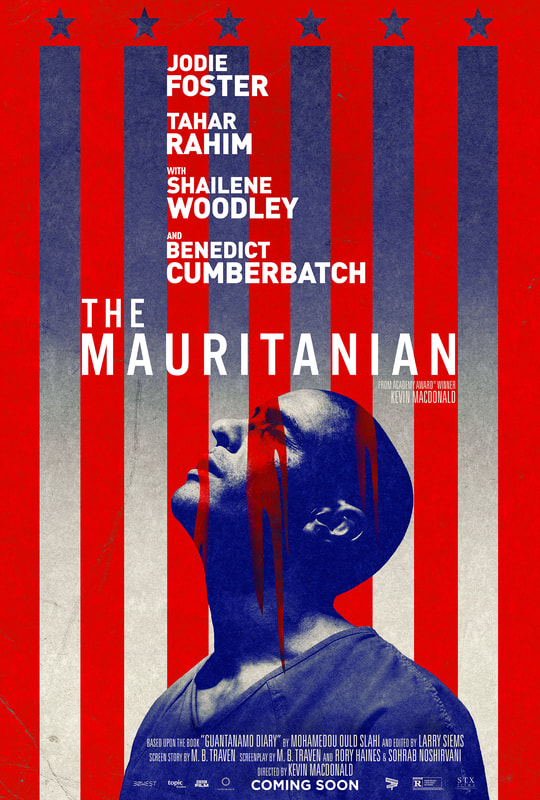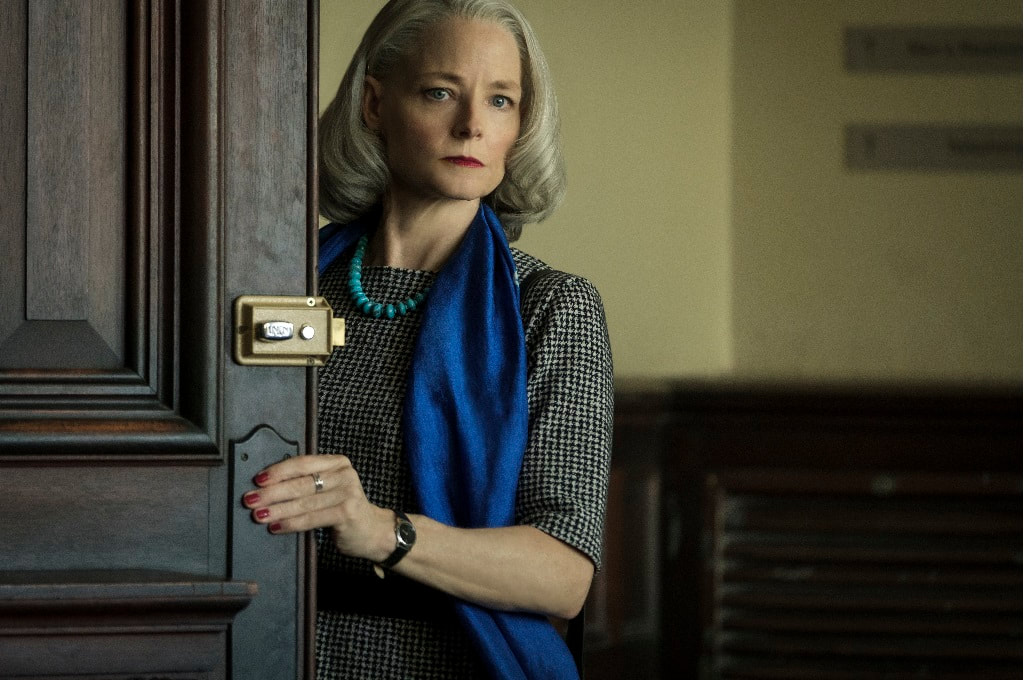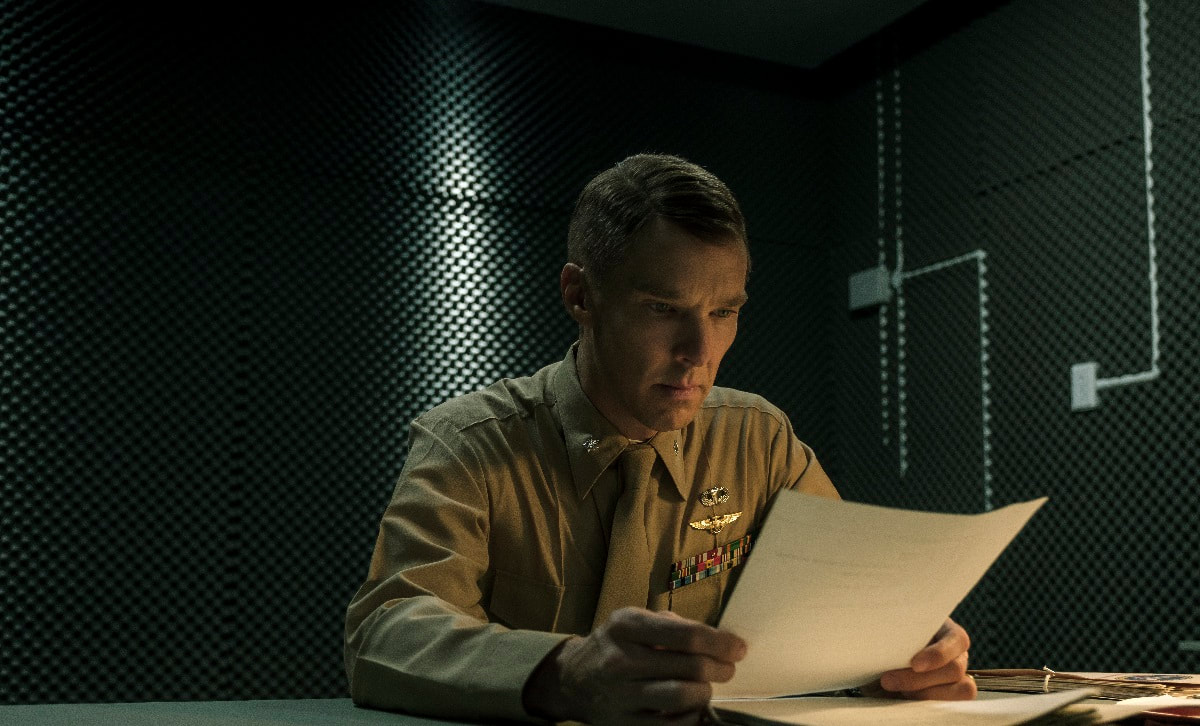|
The Mauritanian tells the true story of Mohamedou Ould Slahi (Tahar Rahim) who was arrested shortly after 9/11 and held at Guantanamo Bay without trial. Albequerqe lawyer Nancy Hollander (Jodie Foster) takes on the task of clearing him, along with a younger protégé Teri Duncan (Shailene Woodley). Together they’re a formidable team but Foster in particular does a terrific job of embodying a powerful woman who takes shit from nobody. She commands any room with her air of authority and smacks her lips with disdain for blindly respecting figures of authority and frivolous procedure. Her lips and fingernails are painted bright red and her hair is a shock of silver. Coupled with a pair of dark sunglasses she makes for quite a scene walking into Guantanamo Bay. Her protégé is more flustered, eager and unsure. She is idealistic and wants the innocent to be freed and the guilty to be punished. In comparison, Nancy wants the evidence to do the talking and the letter of the law to be followed, regardless of guilt or innocence. On the opposing side is lead prosecutor Lt. Colonel Stuart Couch, played with a gravelly southern drawl by British icon Benedict Cumberbatch. He’s a well-ironed suburban churchgoer who comes to discover the realities of what went on at Guantanamo Bay. What follows is a pursuit of justice taking place in a world freshly scarred from the shock of 9/11. It would be easy to emphasise the men vs women element here and the film does well to avoid the temptation to insert a gendered aspect into the opposing sides. There are a few lingering flirtatious looks that we could have probably done without if we were being picky. But the lack of emphasis is a notable positive in itself. Eyes may roll at the old trope of dozens of boxes of papers being wheeled in, threatening to overwhelm the good lawyers. But the film’s main detractor is its unwillingness to explore the dark side of the issue and so it comes across as virtue-signalling in places. Those who ordered that the prisoners should be detained aren’t really mentioned and neither are their reasons for doing so. The American justice system and its people are upheld as good and righteous throughout. There is very little by way of inner conflict or explanation for the atrocious acts that went on at Guantanamo Bay. The guards are generally pushy but nice, the interviewers are kind, the information controller is an affable pun enthusiast, the prosecutor follows his heart. We are told that the average American is grieving from 9/11 but compassionate and despite the Gitmo bad apples, their justice system will eventually come good. The cherry on the top of this all-American feel is a heartfelt speech in court bringing a tear to everyone’s eye. Because who doesn’t love a well-crafted emotional speech? This brings up the issue of truth vs fiction. This is not a documentary, it intends to be a dramatized expose. This particular speech felt sickly and pandering, but one must assume it is a transcript which just happens to be ideally suited for a Hollywood climactic moment. The only ‘bad guys’ are the faceless torturers. Yes their actions are shocking. But what we miss out on is any exploration of their actions. The question that isn’t asked is what lengths should we go to if we truly believed that we could prevent another atrocity? Are the torturers just sadistic sickos or did they have any kind of inner conflict or sense of justice in their actions? If anyone was in any doubt that holding people without charge and torturing them was bad then they might learn something from this film. But with such a black-and-white argument we miss out on the nuances that surround the discussion. Was there any doubt over the guilt or innocence of the detainees and did those involved feel guilt or remorse? Jodie Foster is striking and perfectly suited for her role and I’m glad that gender is not turned into a defining factor. But the film comes across as idealistic and simplifies a complex, emotional and horrific situation. In the end all the good hearted Americans can congratulate themselves for never even wondering whether Gitmo might be a necessary evil. The reality is much more nuanced and, unfortunately, makes for a much more interesting and dramatic film. Comments are closed.
|
AuthorHi, I'm Caz. I live in Edinburgh and I watch a lot of films. My reviews focus mainly on women in film - female directors or how women are represented on screen. Archives
December 2021
Categories
All
|





 RSS Feed
RSS Feed
